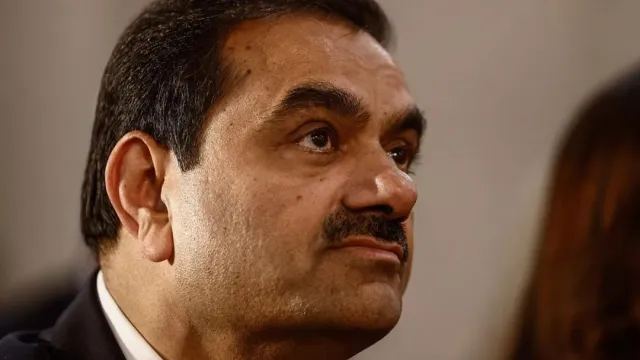Gautam Adani approved bribes himself: US prosecutors

Indian billionaire Gautam Adani, once celebrated for his sprawling business empire, is facing charges from the US Securities and Exchange Commission (SEC).
On November 20, 2024, in a New York courtroom, a case unfolded that would have ripples far beyond US borders. Indian billionaire Gautam Adani, once celebrated for his sprawling business empire, faced charges from the US Securities and Exchange Commission (SEC).
The charges centered on a massive bribery scheme amounting to roughly KES32 billion, and the fallout reached as far as Kenya, where Adani’s multimillion-dollar infrastructure deals were to suffer abrupt end just the following day.
Adani’s troubles spelled disaster for his lucrative ventures in Kenya where he had secured a multi-billion shillings’ project to build and operate new electricity distribution lines.
During his State of the Nation address on Thursday, President William Ruto announced the immediate cancellation of contracts between Adani Group and the Ministry of Energy and Petroleum. This deal, worth KES96 billion and signed in October, involved developing power transmission lines with the Kenya Electricity Transmission Company (KETRACO).
Another casualty was a proposed KES92 billion project at Jomo Kenyatta International Airport (JKIA) where Adani had sought to modernize East Africa’s busiest aviation hub. This project had already drawn public scrutiny after whistleblowers revealed its details. With mounting pressure, Kenyan officials struggled to defend Adani Group in the face of mounting transparency and accountability questions from concerned parties.
The New York case against Adani
The SEC’s case against Adani centers on allegations of fraud and bribery in India’s renewable energy sector. Gautam Adani, alongside his nephew Sagar Adani, and Cyril Cabanes of Azure Power Global Ltd., are accused of orchestrating a scheme to secure favourable energy deals from the Indian government.
These deals involved paying massive bribes to ensure above-market rates for energy purchases, benefiting Adani Green Energy Ltd. and Azure Power.
The scheme unraveled during a 2021 bond offering by Adani Green, which raised $750 million, including $175 million from US investors. Adani’s offering documents falsely claimed adherence to anti-bribery compliance standards, a deception that became central to the SEC’s charges.
Read also: Sh32Bn graft suit in US forces Ruto to drop Adani contracts
Kenya caught in the crossfire
While the SEC’s charges were specific to India and US investors, the ripple effects were global. For Kenya, the revelations sparked swift and decisive action. The case appeared to have piled immense pressure on President Ruto's government to act swiftly as critics noted that the graft suit deeply undermines confidence in Adani’s dealings.
"I now direct, in furtherance of the principles enshrined in Article 10 of the Constitution on transparency and accountability, and based on new information provided by our investigative agencies and partner nations, that the procuring agencies within the Ministry of Transport and the Ministry of Energy and Petroleum immediately cancel the ongoing procurement process for the JKIA Expansion Public Private Partnership (PPP) transaction, as well as the recently concluded KETRACO transmission line Public Private Partnership contract, and immediately commence the process of onboarding alternative partners,” Dr. Ruto told Parliament during his State of the Nation speech.
These cancellations reflect the Kenyan public's growing intolerance for controversies tied to foreign investments, especially in critical sectors such as energy and transport. Public trust is paramount, and the fallout from the Adani case serves as the latest reminder about the risks of unchecked partnerships.
Bribes, Bonds, and Broken Promises
At the heart of the SEC’s allegations are claims that Adani Green misled investors by falsely advertising robust anti-bribery policies. As investigators revealed, senior executives, including Gautam Adani himself, were directly involved in approving bribes.
The bribes aimed to secure long-term agreements with the Indian government, ensuring steady cash flow for Adani’s renewable energy ventures. The deceit extended to the US markets, where Adani sought to capitalize on the global appetite for green investments.
“As alleged, Gautam and Sagar Adani induced U.S. investors to buy Adani Green bonds through an offering process that misrepresented not only that Adani Green had a robust anti-bribery compliance program but also that the company’s senior management had not and would not pay or promise to pay bribes, and Cyril Cabanes participated in the underlying bribery scheme while serving as director of a U.S. public company,” said Sanjay Wadhwa, Acting Director of the SEC’s Division of Enforcement. “We will continue to vigorously pursue and hold individuals, including senior corporate officers and directors, accountable when they violate our securities laws.”
While both the KETRACO deal and the JKIA project were emblematic of Kenya’s ambition to attract foreign investment, the association with a global scandal risked tarnishing the country’s reputation.
Gautam Adani’s fall from grace in Kenya is a striking example of how corruption scandals can have a domino effect, impacting far-flung ventures.
As the case unfolds, one thing is clear: the case that dashed Adani’s infrastructure dreams in Kenya will serve as a pivotal moment in the country’s investment, shaping how deals are scrutinized and executed in the future.



